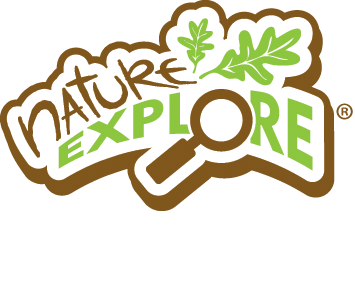The Recess Bell Rings
By Dexter Lane, Nature Explore Consultant
Outdoor time is about to begin in two elementary schools. For one, this time is called “recess.” It takes place on a playground, with an asphalt surface for ball games and running, and a large multi-stationed climbing structure surrounded by green safety matting. The other school has a Certified Nature Explore Outdoor Classroom, complete with many activity areas and teachers trained to enhance children’s learning experiences in nature. Outdoor time in this school is called “nature time.”
Joey, six, is standing in line waiting for his teacher, Miss Smith, to open the door for recess. Yesterday, a larger boy pushed Joey while they were both on the climbing structure. Miss Smith intervened. Joey is avoiding this boy today. As they all wait to go outside, Joey is preoccupied with staying away from him on the playground. He would like to play kickball, and climb again, but will have to wait until he gets outside before figuring out what he can do. He is planning on staying in sight of Miss Smith.
Miss Smith has been keeping an eye on the child who was teasing Joey yesterday. He is at the top of a short list of children she will monitor every few minutes. As usual, she constantly scans the entire playground to ensure the children are safe, and to intervene in any trouble before it amplifies. She also looks for signs of accomplishment (the child that invites others to play, the child that masters a new activity) so she can provide reinforcement. But the play is basically running, climbing, swinging, sliding, or playing ball; good activities for building gross motor skills, yet also effective at fostering conflict in the children, and for requiring vigilance in the teacher. Miss Smith sees little variety in play from day to day, and knows which children are most likely to be involved in interactions requiring monitoring. She has settled into a routine that keeps kids active, safe, and rewarded whenever possible.
Mikeyla, also six, is about to go outside for “nature time” in her school’s Nature Explore Outdoor Classroom. Yesterday evening, her dog, Bounder, died. He had been her companion since she was a baby, and this the first major death she’s ever had to process. As they gather, Mikeyla tells her friends of Bounder’s death. Previously, they had been talking about making a play in the Music and Movement Area, based on Disney’s “Frozen.” Mikeyla started talking with the “cast,” and said she might like to join them. But first, as she does every day, she’d like to visit the vegetable garden to see the babies starting to grow.
Miss Hewitt, their teacher, had overheard Mikeyla, and approaches the group. “Maybe you could add a dog to your play, and call him Bounder. Would you like that?”
Mikeyla quietly says “yes,” and her friends agree.” Soon, while performing their play outdoors, a large stick would become Bounder to Mikeyla’s Anna. Miss Hewitt, from a distance, watches their play. (Later, when Mikeyla’s parents ask Mikeyla about her day in school, she’ll tell them how she had played again with Bounder in their production of “Frozen.” Her parents will grasp this opportunity to encourage Mikeyla to talk more about her loss, and to help her grieve.)
Now, holding a notepad to document significant observations, Miss Hewitt gathers the children in the meeting area of the outdoor classroom. She asks them if they have been noticing anything different in the vegetable garden. Mikeyla says that she sees baby vegetables growing, but doesn’t know what they are. Miss Hewitt asks who would like to go to the garden with her to look at the plants, and compare them to the pictures of the vegetables that are growing. Hands are raised. She then asks if anyone has plans for what they want to do today. “We’re going to play ‘Frozen,’” says one girl, “and we’re going to have a dog.” Other children ask to join. Two boys say they want to make the hole in the Dirt Digging Area deeper than they left it yesterday. Miss Hewitt looks toward a boy who hasn’t been able to keep still all morning. “You look like you have lots of energy today, Johnny. What do you want to do?” “Climb!” he says. “When we finish looking at the vegetables, I’ll come over and watch you climb on the treehouse,” she says. Later, Miss Hewitt reflects on the diversity of activities that took place during “nature time” that morning: her many opportunities to support the learning she saw; the children’s performance of “Frozen;” and Johnny’s vigorous play in an activity he chose. She smiles as she thinks to herself, “In the outdoor classroom, I can be the teacher I’ve always wanted to be.”
What do Joey and Mikeyla learn about themselves through their time outdoors at school? Which conceptions of children do Miss Smith and Miss Hewitt develop as a result of their time outdoors at school?
In part two of this series, we’ll look at possible answers to these questions.


